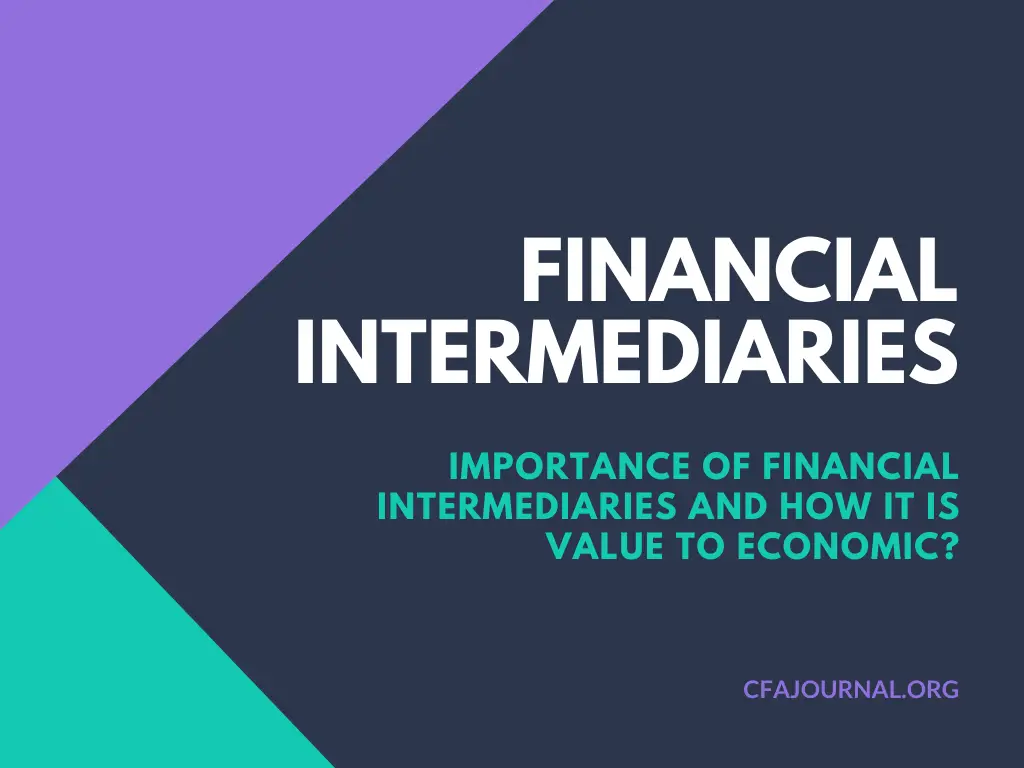Financial intermediaries play a very significant role in the economy. A financial market is a physical place where financial instruments are traded.
By using financial intermediaries, financial markets facilitate the flow of money from lenders to borrowers, which helps improve the economy.
Financial intermediaries are required for many reasons different parties have different requirements to save transaction costs and avoid asymmetric information.

Importance of Financial Intermediaries
Financial intermediaries hold the middle position between two parties and manage the financial transaction.
The financial intermediaries are commercial banks, investment banks, stock exchanges, insurance companies, etc. and these institutions play a vital role in the economy.
With the help of financial intermediaries, individuals can get a fixed income at a low cost. When an individual uses financial intermediaries, he doesn’t require to spend time and money to find good borrowers.
He doesn’t have to bear the risk of loss as the financial intermediaries bear the risks.
For example, banks obtain funds from people who want to deposit and lend those funds to people who want to borrow. Banks maintain information and policy statements about their clients, and they diversify their investments accordingly.
Financial intermediaries monitor the borrower’s activity, and if borrowers have any chance to invest in a risky project, they suggest solutions.
Financial intermediaries play an important role in the saving-investment process. An essential role of financial intermediaries is that they satisfy the portfolio preference of both depositors and borrowers at the same time.
They invest the pooled funds by issuing securities like bonds, mortgages, bills, etc. Instead of directly purchasing stocks, savers deposit funds with financial intermediaries and lend those funds to ultimate borrowers.
Non-bank financial intermediaries supply debt instruments to the borrowers independent of the type of the asset and offer financial assets to the lenders independent of the type of the debt instrument.
Besides bringing depositors and borrowers together, financial intermediaries transform primary securities into secondary securities for the portfolio of ultimate lenders.
By following techniques, intermediaries distribute primary securities from ultimate borrowers to ultimate lenders.
They increase the efficiency of resource allocation by investing in different projects and improve the efficiency of distributive techniques of intermediation.
Their role in the saving-investment process is such influential that they inspire investors to spend more efficiently.
In under-developed countries, the capital market is unorganized, and financial intermediaries play a special role.
Most people are poor in those countries, and those who save invest their savings in real estate, jewelry, foreign exchange, etc.
Financial intermediaries encourage the circulation of personal savings from unproductive to productive uses. When a country’s economy develops, the non-financial sector is gradually transformed into the financial sector.
Then the banking habits of people also increase. Commercial banks alone cannot organize savings and put them to productive use.
Then the role of financial intermediaries becomes important in organizing and investing these savings for economic development.
In under-developed countries, financial intermediaries find investment opportunities by helping small and new enterprises.
In such countries, financial intermediaries help economize the use of money, which controls the money supply and the demand for goods and services. Thus, they help in controlling inflation in underdeveloped countries.
Financial intermediaries exist because of the need for two parties: lenders and borrowers. They help them lower risks by diversifying investments and saving time and costs.
They offer a large number of services, so they can customize services for their clients. They lower the risk of asymmetric information.
So it is clear that financial intermediaries are important for the economic development of a country.
They provide finance for starting self-employment programs, entrepreneurial development programs, housing finance, a certain percentage of their lending to priority sectors, and loans to industries started in a backward area.
However, the financial intermediary also has risks of default, liquidity risk, credit risk, etc. Examples can be found if we look back to the last financial crisis and the collapse of the biggest financial institutions worldwide.
Every party should bear the risk to be able to continue. Transferring all the risks is not the solution which means one party will not have anything and the other party will have everything if an economic crisis occurs.
If the collapsing party is the bank, the crisis will extend to the whole economy. However, given the complexities of the financial system, financial intermediaries play a very important role in the economic development of a country by helping the government to eliminate poverty and implement different social programs.
